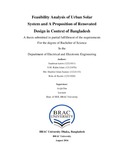Feasibility analysis of urban solar system and a proposition of renovated design in context of Bangladesh
Abstract
Daily headlines make everyone aware of the dangerous long-term effects of power generation from the fossil fuels. It is widely believed that continuing to depend on fossil fuels to generate electricity can cause serious environmental problems. Moreover, fossil fuels are finite in amount and cost a lot of money as well. Hence, renewable energy is a potential solution to meet up electricity demand for the developing countries like Bangladesh. Among all the renewable technologies, solar photo voltaic (PV) is the most potential, favorable and promising one which converts solar energy into electrical energy, including or excluding battery backup. Although solar technology has nearly been successful in rural areas where most of the technologies are adopted based on Solar Home System (SHS), it has not yet been effective in urban areas after the imposed rule of meeting 3% of light fan load of a building. We have investigated the installed solar rooftop of 25 houses in Mirpur, Dhaka where the solar system of most of the houses were found inactive. Among them only 13 systems are active. In this thesis the overall analysis of urban solar prospect has been done in three layers based on this investigation. A comparable discussion on cost efficiency of different solar panels has been given depending on amounts of loads being run. Efficient batteries are modeled by HOMER in context of Bangladesh to improvise PV systems. A cost analysis has been performed by software HOMER for different types of watt peak ranges. Apart from these, a renovated design of solar system has been proposed to make urban rooftop solar installation effective and successful.

